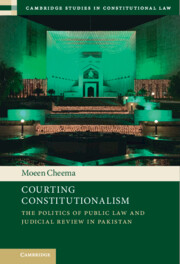Book contents
- Courting Constitutionalism
- Cambridge Studies in Constitutional Law
- Courting Constitutionalism
- Copyright page
- Dedication
- Contents
- Acknowledgements
- Table of Cases
- 1 Introduction
- 2 Postcolonial Legality
- 3 Martial Rule
- 4 Elective Dictatorship
- 5 Praetorian Governmentality
- 6 Indirect Praetorianism
- 7 Military–Civil Composite
- 8 Corporatist Governance
- 9 Conclusion
- Bibliography
- Index
2 - Postcolonial Legality
Fragments of the Rule of Law and Constitutionalism
Published online by Cambridge University Press: 16 December 2021
- Courting Constitutionalism
- Cambridge Studies in Constitutional Law
- Courting Constitutionalism
- Copyright page
- Dedication
- Contents
- Acknowledgements
- Table of Cases
- 1 Introduction
- 2 Postcolonial Legality
- 3 Martial Rule
- 4 Elective Dictatorship
- 5 Praetorian Governmentality
- 6 Indirect Praetorianism
- 7 Military–Civil Composite
- 8 Corporatist Governance
- 9 Conclusion
- Bibliography
- Index
Summary
Chapter 2 provides an account of the emergence of an inchoate ‘Writ’ jurisdiction in the late colonial period in British India. It is the limited availability and partial success of a procedural form of rule of law in moderating the authoritarianism of the colonial state, despite its larger failures, that account for its lasting resonance amongst segments of the colonised elites. In the first decade of postcolonial existence, as the Constituent Assembly of Pakistan failed to draft a constitution until 1956, The Government of India Act 1935 remained the interim framework. The role of the newly empowered superior courts will be particularly scrutinised with regard to their alleged complicity in the uprooting of constitutionalism and democracy in the first decade of the republic’s existence. However, despite their seeming subservience to the executive the courts continued to push the political elites that came to dominate the new state towards framing a republican constitution. Most notably, the dislocations in the state structure caused by the partition of British India also gave the courts the space to extend their administrative law jurisdiction through the newly-established ‘Writ jurisdiction’ over a bureaucracy that was in the process of reconstruction.
Keywords
- Type
- Chapter
- Information
- Courting ConstitutionalismThe Politics of Public Law and Judicial Review in Pakistan, pp. 17 - 56Publisher: Cambridge University PressPrint publication year: 2021

